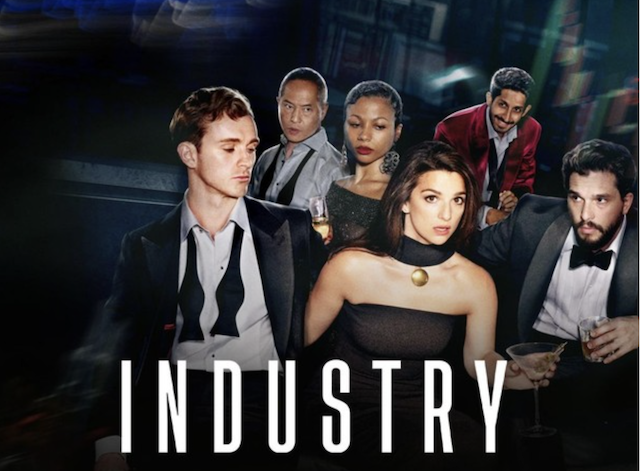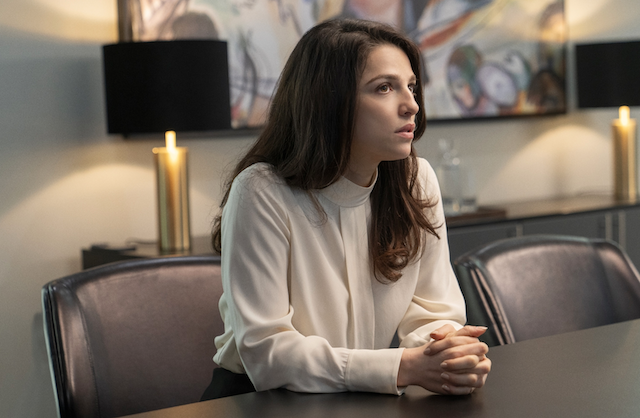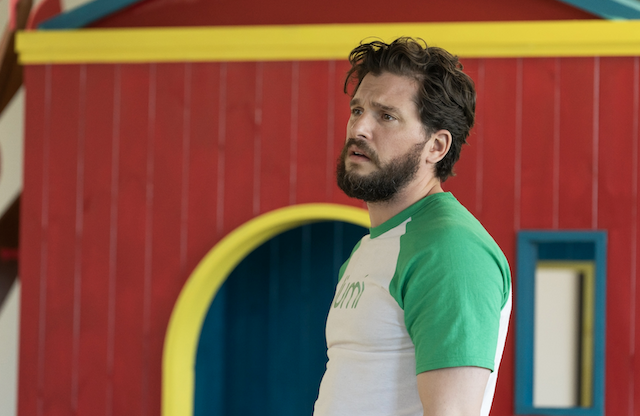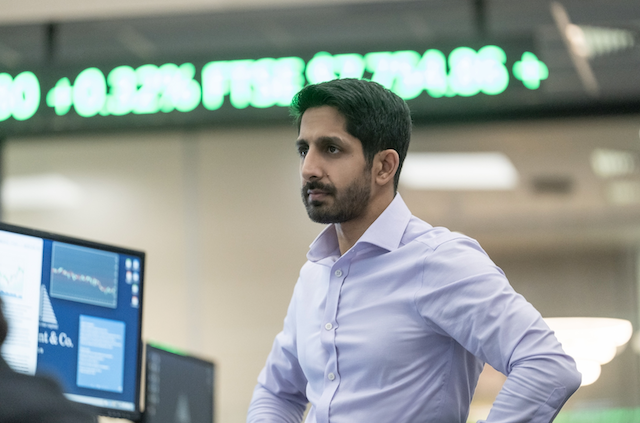
©Courtesy of HBO

Q: How does Season 3 expand the world that we admired in the previous two?
Mickey Down: Expanding the world was the mandate for the writers room at the very start. We have a show about young people entering into a bank which is the genesis of this series. We called it Industry because we couldn’t think of another title. But actually it worked out quite well, because it became quite a universal topic that we could discuss and explore. In the first season you never really saw the upper echelons of the bank. It was about what it’s like to sit next to someone for 20 hours a day sometimes.
How do you get your boss to like you, to respect you? Then in Season 2, as the characters grew and we got a little more responsibility, we could raise the stakes a bit, so it felt like an organic place to raise the stakes and in season 3, we did the same thing again. Especially in season one, we did not hold the audience’s hand at all.
I actually rewatched season one quite recently and I just could not believe how harsh we were to the audience, not telling them what actually these people did for a living. So by the time we got to season 3 we really wanted to show how banking fit into a wider industrial complex. We wanted to write stuff that we found interesting, which is green energy.
Q: You all have very interesting arcs this season, but does anyone feel like they had something that was particularly challenging to do on screen, something that they were maybe a little nervous about?
Sagar Radia: Mickey and Konrad came to me with this idea in episode 4. It was quite a daunting task. It was quite flattering and really humbling at the same time. You look at a script like that, and you just have to try and figure out how to break that down and how you’re gonna play it. And you don’t know where you’re gonna start. So that was definitely a big challenge.
Marisa Abela: Yasmin’s personal life is interesting to explore. She’s always kind of been a bit of a breath of external life from the bank, I think, because she’s got quite a rich family situation. In Season 3, it just explodes even heavier onto her. Figuring out how to deal with the knowledge of that experience and what that means to Yasmin and her still existing in this situation, with these people in a bank was definitely a challenge. That’s the great thing about coming back to a TV show like this, becauseYasmin is gonna be the same person.
Q: Kit, were you already a fan of the show? How did you decide that this was something that you wanted to do?
Kit Harrington: I’d seen the first two and loved it, thought it was utterly unique. I actually don’t like it being compared to other shows – I know we do it all the time – but being compared to Succession and Euphoria, it’s its own thing. I thought it was entirely unique as a show and that’s why I jumped at the chance to be in it when it came up.
Q: You have a lot of scenes with Harry Lawtey: can you speak a little bit about the experience of working with him on set for that first episode, and then throughout the entire season?
Kit Harrington: We got quite a bromance going quickly. I like taking photos of Harry. I do. I’ve got a lot of photos of Harry. He’s a very good-looking man. Their relationship is fascinating because of their backgrounds. This season being so much, in so many ways, about the British class system, Harry and I spoke about this, how they sort of love and hate each other, and that goes right back to their class: Robert, a working-class background, Henry, being from a from a more aristocratic upper class background: traditionally in the UK those two class systems tend to join forces, and like each other in their mutual hatred of the middle class. That was useful for us going through that, we loved and hated each other in that way.

Photograph by Simon Ridgway/HBO
Q: Can you speak about the writing process, regarding so many characters with different backgrounds?
Mickey Down: The way this show was unlocked for us when we started first coming up with it, was that it was going to feel like the sort of people that you would never have expected to be in this situation, because it’s usually from a sort of top down lens, and it’s rich white people who are at sort of the apex of their career rather than people who are slightly more marginalized within this. That was always exciting about it, it was always going to be an outsider story. Even though they have this really rigid system in the UK, there’s lots of blue-blooded people in these places. Especially in the American investment banks – there is lots of diversity on the trading floor. That diversity works very well, but clashes quite a lot as well.
Q: What was your decision-making process like in terms of waiting to put women at the forefront of this show?
Mickey Down: We wanted a complex relationship between two women at the center of the show, two women from vastly different backgrounds, two people who would never be brought together had it not been for this bank. That’s the beauty of a workplace drama. Especially if you’re working at an investment bank, you’re spending sometimes like 20 hours a day with these people you’ve not chosen to spend time with, people who are different to you, the only thing really you have in common is that you walk on the same patch of carpet 20 hours a day. But these relationships become incredibly important, smashing those two things together was at the genesis of the show.
Q: How do you feel about Harper’s development from where she was at the beginning of season one to where she is at the beginning of season three, and what were you most excited to play this season?
Myha’la: When they found out her secret in season two, and when we find her in season 3 this could feel like the lowest of the low for her. She’s like a desk assistant. She’s keeping a diary and forwarding calls. That is not what she’s meant to be doing, and she doesn’t want to do that. But that’s her ticket to stay in London, and that’s always been the thing for Harper. Harper’s gonna ask this morality question of herself for the first time, and see if it’s possible for her to function in this industry, in this world, in a way that’s not so isolating, that’s not so sneaky. She’s asking herself questions for the first time: do I have to be this way? Does it have to be this way? Can I maintain my life and relationships, get what I need, and what I want, without railroading everyone and everything around me? That was absolutely exciting to explore what that feels like in her body.
Q: Yasmin’s life and career are a mess. What do you think motivates Yasmin? What does she want, what does she think about as she’s trying to achieve her desires in personal life and in career?
Marisa Abela: For Yasmin, the answer to that question has changed. For Harper what she wants has been the same since season one, whereas for Yasmin, the stakes were so much lower for her in season one. What she wanted was to have a nice time at work, and people to take her seriously. In season 3 the stakes are much higher for Yasmin. She has her own bank account and it’s pretty empty. She needs this job for the first time. Her main objective this season is to survive, to keep her head above water. That’s a huge step from season one where her objective is to have fun, maybe flirt with some boys.
Q: How do you deal with playing someone complex like Rishi?
Sagar Radia: We live in a world now where there’s information overload. In a way, when you’re researching a character and trying to put together a character, it’s not that difficult when there’s an influx of information, just reading finance books and things like that to try and construct something. In London, especially in the finance sector, there’s a big South Asian diaspora that is present. You go down to Canary Wharf or Liverpool Street, and there’s a large cohort of South Asian finance bros and that always helps. I grew up with a lot of them, I’ve got friends who work in that industry. I’ve got a family who work in that industry, so actually it was a bit easier than I thought it was going to be.

Photograph by Simon Ridgway/HBO
Q: What is on your mood board as writers and directors when you are dreaming up this world?
Konrad Kay: Michael Mann movies. Moneyball.
Mickey Down: We directed the last 2 episodes of the show which was a massive privilege, and we’re very thankful to be able to do that, no one else was gonna let us. Episode 7 is a sort of quintessential episode of Industry in that it’s just a ticking clock, fast paced financial storyline. We have to deliver that kind of Michael Mann, fast paced, everything feels like an action movie version so that we could do episode 8, which is like a period drama. And that episode we shot it like Barry Lyndon. We got to shoot in that house of The Remains of the Day by James Ivory. Stuff that feels very, very far away from Industry as a reference. Konrad: We always just wanted to make period dramas. We wanted to make like Hallmark movies about people in the 19th century and so that’s a kind of a Trojan Horse.
Mickey Down: We’re like the new Merchant Ivory. If we could do that, we’d do that forever.
Q: What’s your experience like coming into this almost fully formed family unit as sort of an outsider, and infiltrating or being accepted into this different set up of a group?
Kit Harington: There’s a lot of actors in this show who are brilliantly talented young actors. This was their first job, that was my experience on Game of Thrones, that does bring a level of excitement. I genuinely believe in a successful TV show such as this, or Game of Thrones, a lot of the work is done offset. It’s in the relationships that are built up offset. It’s in how people kind of get on. It’s a family unit. But it’s also in the excitement brought to the show by a group of people coming in.
Q: What was your favorite aspect of the previous two seasons? Was there one scene or one moment that you really thought about over and over again?
Kit Harington: Who is it that runs into the glass wall? Greg? That just sums it up for me. It’s this brilliant, brutal, horrific moment that’s comic and strange, takes your knees out. I think what’s brilliant about Industry for me.
Q: Could you talk a little bit about how being the only person in the room is a motivation for the characters’ behaviors?
Konrad Kay: The show is interested in how people have a fixed identity, but then the trading floor – and this is something we know from our experience – forces them to perform an identity as well. The gap between those two things is where the interest in the characters lie, especially in Rishi. It’s like: I have a certain opinion about myself. Given where I’m from, my security level, I feel like there’s a kind of version of masculinity which makes me really successful in this place.
We were interested in just seeing our friends who’ve been in the business for 15 years and changed quite a lot. We were trying to unpack all that stuff. We don’t really think about the theme that much when we’re first writing the episode, we think about plot and character. But then, as we were rewriting the episode, this is the stuff that’s bubbling to the surface.
Mickey Down: You give up your identity like a lot of people in finance. There’s a slightly cookie cutter mentality the way that people behave when they go in there: they start wearing the same clothes as the people around them. They start acting in the same way. You give up whatever identity you had before to become the Pierpoint individual. Rishi is a perfect example of that: I’m not necessarily a South Asian British guy. I’m just a trader, this is how I am, I haven’t taken a second to think about my background or my relationship with it, because I’m a trader, and that’s what I am at this moment.

Photograph by Simon Ridgway/HBO
Q: Who is Sir Henry, exactly? How do you see him? What was so irresistible about him to bring you back to series television?
Kit Harrington: I’ve known a lot of people like Henry. I’ve just met a lot of them. What I found fascinating about him was that he can’t see his own privilege, amazingly. He might say he does, but he can’t see it. I thought that that was a fascinating place to start with someone and explore someone in that place of privilege. Yet they’re deeply not happy, and don’t know who they are. The idea of someone charming and yet threatening is a really fun one to play. We had this joke going about how many times he uses the word “vulnerable” in the show, and he’s that modern guy who’s gone to therapy and understands fully the world has changed, and that he, as a man, has to change with it. But will now manipulate women with therapy chat and doesn’t see it. I just thought, what a wonderful character to get on board with.
If you like the articles, share your thoughts below!
Check out more of Adriano’s articles.
Here’s the trailer for Industry Season 3:
\

